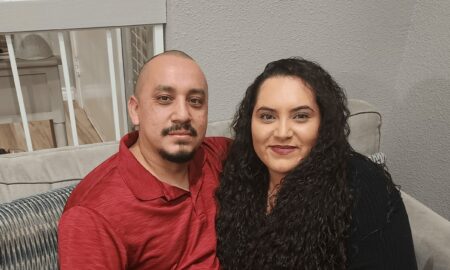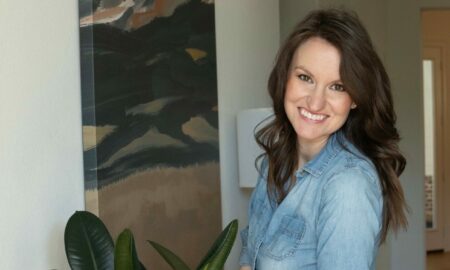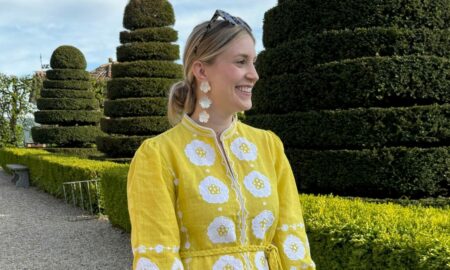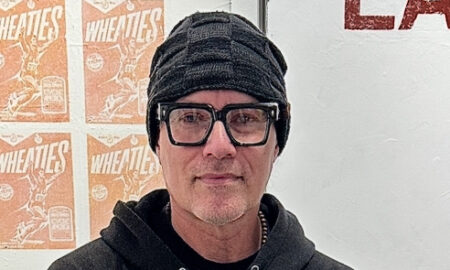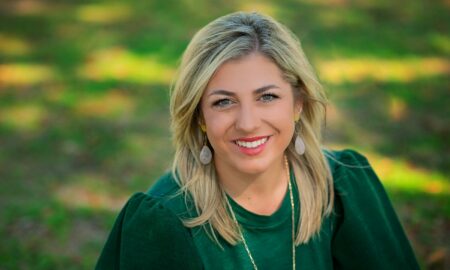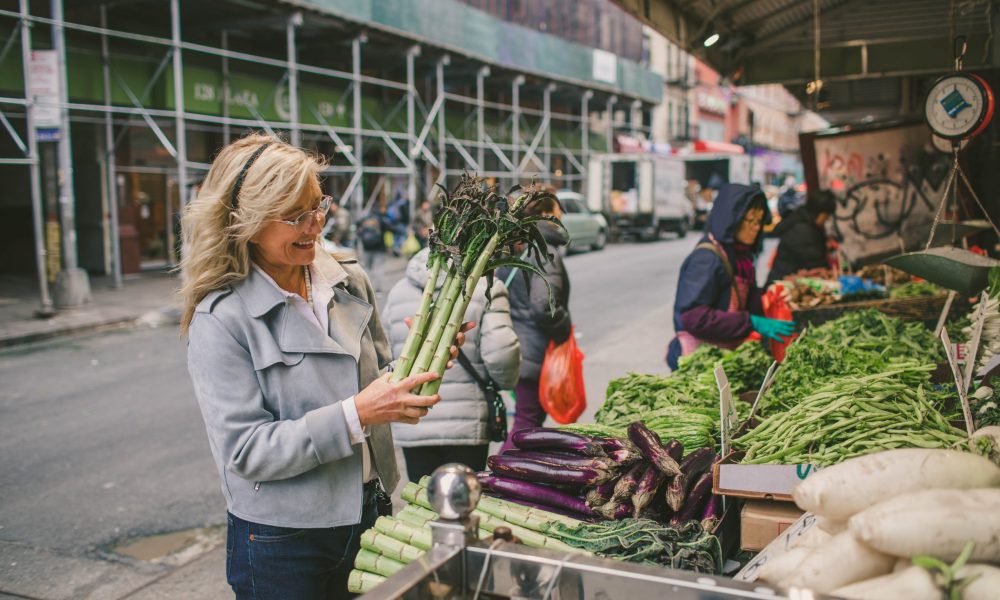

Today we’d like to introduce you to Shannon Smith.
Thanks for sharing your story with us Shannon. So, let’s start at the beginning and we can move on from there.
Bridesmaid dresses. That was my first career. I made at least 500 of them during the ten years of my first marriage. Plus a lot of prom dresses, pageant dresses and draperies. I got a degree in Home Economics when Home EC was becoming less and less cool. But I loved to sew and I wanted to be a teacher just like Miss Craig, my high school home ec teacher. That dream didn’t quite work out though. My student teaching experience was miserable, and I decided I couldn’t be a teacher. I went to graduate school to study clothing design and I met my first husband.
I grew up in a very conservative and strict home, and I am the oldest of three daughters. Mom taught us at a very young age that we were required to marry a boy from the same church denomination where we attended. After having dated very little in college, I knew that my time was running out to find the husband my parents would approve of. When I found him, it didn’t occur to me that he had little motivation to make a living. I started a sewing business in our apartment and soon had so much work I was unable to finish my graduate school thesis. I sewed 10-16 hours days, and I had no life outside my sewing room. The women whom I sewed for had to come to my little house for their fittings, and sometimes I went to them. Occasionally, someone would pick up their dress and tell me they had “forgotten their checkbook” and would send a check in the mail. Sometimes the check never came. Sometimes I got phone calls late at night asking if they could come over to get a dress hemmed or buttons replaced.
I had two children, and when my oldest was three I had a nervous breakdown. I was in the hospital for four days. The doctors put me on multiple anti-depressants and told me to quit my job and learn to be less stressed. I wanted to cry. How would I feed my kids? The day I nearly fell asleep while driving my children to pre-school because I was so medicated, was the day I stopped taking those pills, and I decided to make a change. I told my husband I wanted a divorce. My children and I moved in with my sister where I set up my sewing machine in her living room. Most of my friends deserted me. My parents were devastated. My church kicked me out.
My lawyer told me I needed to get a job with a paycheck, so I could prove to the judge that I could provide for my children in order to get full custody. I got a job with a non-profit teaching underprivileged women and children how to cook. I had a few cooking skills, despite my degree in Home EC, but I knew enough. I taught my classes at a vacant apartment where half the residents were black and the other half were Russian. I was told they didn’t get along. But the kids would fill up that apartment after school, knowing I would feed them, as long as they participated in the cooking. As a result, many of those children became friends. That was my first lesson that food brings people together. I also taught women at a shelter for unwed mothers. Two years after I left my husband, I was granted the divorce and given full custody of my children. I enrolled in a professional chef school in Tulsa where I learned new skills and gained confidence in cooking. And I started making new friends. I also started a new hobby making jewelry. It was therapy for me, and another way to use my creative naturer.
I met my future husband at the gym. At 5:30 am. We dated for several years before he decided he was willing to help me raise my children and commit to me for life. He is my best friend and we’ve been married for fifteen years. We started traveling early in our marriage, and I become fascinated with the world and all its different cultures. I had been teaching cooking classes at the cooking school where I was trained, and I craved learning more. I decided that I would try make our trips more meaningful by seeking out people who could teach me about the food and recipes in those places I visited. I searched the internet for food guides, cooking lessons, and market tours. I emailed restaurants in cities where I would be traveling and asked if I could cook with them during their slow time. I was rarely turned down, and I have learned cooking in many countries around the world, including India, Italy, Greece, Israel, Sri Lanka, Peru, Morocco, Turkey, and Grand Cayman.
It wasn’t long until people started asking me to teach them to cook. Ten home-schooled girls came to my house once a month for two years, and I taught them how to took cook simple meals and meal planning. One of those girls went on to culinary school and is now the head chef at a cooking school in Maine. There were two sisters who took my class, and their mother told me that the oldest sister did not want to learn to cook, but her mother required she attend the class. The first few classes she stood in the back and made it clear she was uninterested. A few months into it, her mother told me that for Christmas her daughter had asked only for cookbooks. I’ve been teaching cooking in my home for 20 years. I teach people in all economic groups, and every age. I particularly enjoy teaching the cuisines I’ve learned around the world and telling stories about the people I’ve met.
My husband has written two books on micro-finance. It’s a program in very poor countries where small loans are given to people so they can start their own businesses. For example, a woman might get a loan to buy some chickens so she can sell eggs. Or a bicycle to be a courier in the village. Or a cooktop to prepare meat pies to sell. We supported many of these microloan programs around the world, and Phil (my husband) spoke around the country about the books and the successes of microfinance.
When my children left for college I decided to become more involved with the people who were receiving these loans. Every year I have a jewelry show in my home where I sell the jewelry I’ve made all year. I donate a portion of my sales to charity. Five years ago I decided to donate to a microfinance program in the Dominican Republic, and I wanted the money to buy sewing machines for women who sew. I wrote an email to Esperanza, the microfinance organization we helped support, and asked if I could send a check to help purchase some sewing machines. The email I received back was this: “we would love to get your money for sewing machines. But we would really like you to come to the Dominican Republic and teach the women how to sew”. My response was “Oh, I don’t teach sewing. I am a cooking teacher, not a sewing teacher”. They replied, “Well, can you come and teach both?!”
A month later, I went to the Dominican Republic with 2 giant suitcases full of sewing tools and kits my friends had helped me assemble so I could teach sewing. I also took recipe packets (in Spanish) for the cooking classes I would be teaching. If you’ve ever been to Dominican Republic and stayed at one of the beautiful beach resorts, you might not know that just a few yards behind those resorts there is extreme poverty. No electricity or running water. I traveled on the back of a motor scooter to get to one of the villages where 30 women were waiting for me. I cooked under a grass roof in the middle of a field while the women watched and listened to my interpreter explain what I was doing. I had purchased the ingredients in a nearby market, and my intention was to teach the women how to make lemon meatballs, a specialty in Italy.
I learned that Dominican Republic does not have lemons, only limes. So, I made lime meatballs and cooked them in a large iron pot over an open fire. Since that day, I’ve never made those meatballs with lemons because the limes were so much better. I prepared two different salads using vegetables and herbs. I was told to toss my food scraps into a pile for the village pig. As I tossed basil and cilantro stems into the pile I noticed women quietly picking them out and saving them. My interpreter asked why they were saving them, and they said they had never seen those herbs before, and they wanted to try to root them and grow them in their garden.
The sewing classes were held in a different village in a parking lot in front of a concrete house. The sewing machines they had purchased with my donation worked without electricity, and the women were sewing outside. They had enough money from my donation to hire a woman from the town to teach the women twice a week to sew. There were 29 women and ten sewing machines. I was their “guest teacher” for the week. Fortunately, I was prepared to teach them hand-sewing techniques since they couldn’t all use the machines, and most of the women didn’t have a machine at home. We made potholders, coin bags, and tote bags embellished with buttons I had brought with me. It was a week before Easter, and the women decided they were all going to save their bags to carry to church on Easter Sunday.
I also traveled to Rwanda three times to teach people how to cook the beautiful food they grow there. There is a school outside the capital of Kigali where I’ve taught the cooks how to prepare meals for the Americans and Europeans that come to visit and support the school. I had the privilege of sitting in on several savings group meetings where Rwandans met each week to contribute small amounts of money into a savings account. They sat in chairs in a circle on a dirt floor with a plastic bowl in the center. Each person had a savings book and the leader of the group called each by name as they dropped their coin into the bowl. If someone wanted to take out a loan on their savings account she had to submit a request on a piece of paper describing the purpose of the loan. Everyone voted as to whether she would receive the loan or not. In one of the meetings I attended, a woman requested a loan to buy tomato seeds so she could plant them and sell tomatoes the next spring. A man requested a loan to buy a piece of tin to use as a roof on his house.
I became friends with many of the women who work for Hope International, the micro-finance program in Rwanda, and on two occasions I taught them cooking lessons in the home of one of the women. The first time I taught, the electricity went out during the first ten minutes of the class and we were in complete darkness. We lit candles and I managed to make pizza in a skillet on the gas stovetop. An hour later, the electricity came back on, and we made apple pie in the tiny electric oven.
On another trip to the Dominican Republic, on a different side of the island, then I had been before, it was requested that I teach Italian food. My interpreter told me in an email that the women who made the request were all in a micro-loan program together, and their homes had no electricity or running water. I’m not sure how they even knew about Italian food. I was pretty sure they wouldn’t have dried pasta in their market, but I knew they grew potatoes. So, for three days I taught 90 women how to make gnocchi, and three sauces to put with it. My husband and I joke that in 100 years the national dish of Dominican Republic will be gnocchi, and they can trace it back to me.
Every time I travel to another country I am more grateful for my home in the U.S. Although those ten years of sewing bridesmaid dresses was difficult and stressful, I learned many valuable lessons. I learned to immediately pay people who finish a job. I learned to respect people who work hard and provide for their families. I learned that a lot of people live in million-dollar houses, and they live off credit. I learned that not all people are nice.
My dream of becoming a teacher didn’t come true into I was in my 30’s, and I now get to teach people of all ages and economic levels. I believe every person has a skill or gift to share. Whether it’s gardening, reading, sewing, or just listening. I challenge you to share it soon. You never know when you won’t get another chance to do it.
So let’s switch gears a bit and go into the Beads and Basil story. Tell us more about your work.
I love to teach people how to cook, particularly poor people…not everyone can afford to learn to cook. I recently started teaching a group of women who were released from prison and going through a program called “Inside Out”. They’re working toward gaining custody of their children and recovering from drug addiction. I teach them basic cooking skills and inexpensive recipes to prepare for their families.
I also enjoy connecting people, particularly in the food industry. I host at least one huge party every year in my home, and I invite local chefs, farmers, food writers, food photographers, and restaurant owners. I cook for them, and many relationships are formed
Has luck played a meaningful role in your life and business?
I’ve been poor, which taught me many lessons that I will never forget. Now that I am no longer poor I have an appreciation for those who work hard and strive to provide or their families. I have an obligation to share my skills to help others. I used to have very little self-confidence, but as I’ve grown older I take every opportunity to make new friends wherever I am in the world. I’ve learned that when I’m in a place where no one speaks English, we all have the common language of a smile. I smile a lot.
Contact Info:
- Website: beadsandbasil.com
- Phone: 918-645-3481
- Email: shannonup@yahoo.com
- Instagram: beads_and_basil
- Facebook: Beads and Basil




Suggest a story: VoyageDallas is built on recommendations from the community; it’s how we uncover hidden gems, so if you or someone you know deserves recognition please let us know here.










